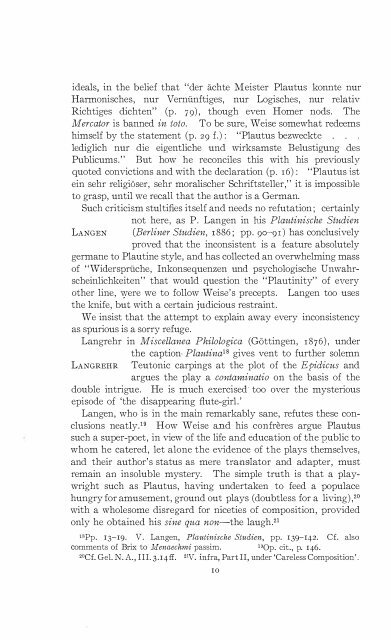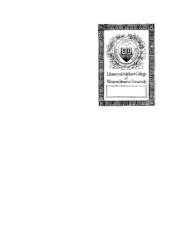Create successful ePaper yourself
Turn your PDF publications into a flip-book with our unique Google optimized e-Paper software.
ideals, in the belief that "der achte Meister Plautus konnte nur<br />
Hannonisches, nur Vernunftiges, nur Logisches, nur relativ<br />
Richtiges dichten" (p. 79), though even Homer nods. The<br />
Mercator is banned in toto. To be sure, Weise somewhat redeems<br />
himself by the statement (p. 29 f.): "Plautus bezwecktc<br />
lediglich nur die eigentliche und wirksamste Belustigung des<br />
Publicums." But how he reconciles this with his previously<br />
quoted convictions and with the declaration (p. r6): "Plautus ist<br />
ein sehr religi6ser, sehr moralischer Schriftsteller," it is impossible<br />
to grasp, until we recall that the author is a German.<br />
Such criticism stultifies itself and needs no refutation; certainly<br />
not here, as P. Langen in his Plautinische Studien<br />
LANGEN (Berliner Studien, r886; pp. 90-9r) has conclusively<br />
proved that the inconsistent is a feature absolutely<br />
germane to Plautine style, and has collected an overwhelming mass<br />
of "Widerspruche, Inkonsequenzen und psychologische Unwahrscheinlichkeiten"<br />
that would question the "Plautinity" of every<br />
other line, \yere we to follow Weise's precepts. Langen too uses<br />
the knife, but with a certain judicious restraint.<br />
We insist that the attempt to explain away every inconsistency<br />
as spurious is a sorry refuge.<br />
Langrehr in Miscellanea Philologica (Gbttingen, r876), under<br />
the caption. Plautina18 gives vent to further solemn<br />
LANGREHR Teutonic carpings at the plot of the Epidicus and<br />
argues the play a contaminatio on the basis of the<br />
double intrigue. He is much exercised too over the mysterious<br />
episode of 'the disappearing flute-girl.'<br />
Langen, who is in the main remarkably sane, refutes these conclusions<br />
neatly.19 How Weise and his confreres argue Plautus<br />
such a super-poet, in view of the life and education of the public to<br />
whom he catered, let alone the evidence of the plays themselves,<br />
and their author's status as mere translator and adapter, must<br />
remain an insoluble mystery. The simple truth is that a playwright<br />
such as Plautus, having undertaken to feed a populace<br />
hungry for amusement, ground out plays (doubtless for a living),20<br />
with a wholesome disregard for niceties of composition, provided<br />
only he obtained his sine qua non-the laugh.21<br />
18p p. 13-19. V. Langen, Plautinische Studien, pp. 139-142. Cf. also<br />
comments of Brix to Menaechmi passim.<br />
lO Op. cit., p. 1 46 .<br />
2°Cf. Gel. N. A., III. 3.14ff. 21V. infra, Part II, under 'Careless Composition'.<br />
10
















